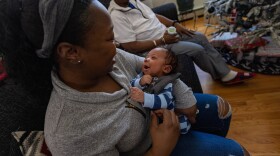-
'Will my life be cut short too?': Cleveland 10-year-old wants action after gun violence kills friendAfter losing his best friend to gun violence, Lorenzo Roberson has called on the City of Cleveland and its leaders to combat the issue before more lives are lost.
-
Ideastream's Connecting the Dots series features stories about gun violence and the Northeast Ohioans working to find solutions.
-
A lawyer with Legal Aid is holding trainings with law enforcement to teach police officers about a form that can be used in the Ohio court system to track firearms in domestic violence cases.
-
The Lorain County Urban League provides a new violence interruption program with a public health approach to solving gun violence.
-
The Eddie Eagle cartoon, produced by the National Rifle Association in the late 1980s, is being used in Cleveland, Akron and cities across the country to try to teach children gun safety. But research shows it's ineffective.
-
Law enforcement touted dozens of gun arrests in 2023, many for selling machine gun conversion devices.
-
In the program, "credible messengers" - past gun crime offenders - work with individuals in the community to find peaceful alternatives to conflict.
-
Since the Neighborhood Safety Fund's rollout in fall 2023, the city has granted two million dollars to 43 community groups.
-
4-H offers a shooting sports program to Ohio kids, according to officials. Kids can also partake in the sport at 4-H camps across the state, according to officials.
-
University Hospitals Rainbow Babies & Children’s Hospital's Antifragility Initiative treats young gun violence victims' trauma to reduce retaliation and re-injury.
-
National gun violence numbers have fallen since the pandemic, but cities like Cleveland are bucking the trend with increased firearm deaths in 2023.
-
A Tuesday afternoon march protesting police violence in Cleveland Heights and the killing of Christian Thomas ended up at city hall, where Mayor Kahlil came out to answer protesters' questions.
Ideastream Public Media investigates how racism contributes to poor health outcomes in the Cleveland area and uncovers what local institutions are doing to tear down the structural barriers to good health.
A podcast that addresses livability metrics and recent findings surrounding the health and wellness challenges faced by Black women in Northeast Ohio.
-
A significant number of new HIV infections happen among Black women, and a health education effort in Atlanta wants to make sure Black women can access the HIV-prevention medicines known as PrEP.
-
Cuyahoga County Executive Chris Ronayne says the Women's Health Advisory Council will consist of 13 people from varied backgrounds.
-
Minority participation is low among registered organ transplant donors, despite record numbers of transplants last year.
-
Journalist Betty J. Halliburton explores the experiences of Black women in Cleveland as they navigate systems affecting their health and well-being.
-
Members of the Black and Jewish communities are working to build relationships between the two groups while collaborating on various projects to fight inequity in healthcare and other areas.
-
The Racism as a Public Health Crisis Coalition (RAPHC-C), which formed in 2020 when the city declared racism a public health crisis, held a town hall meeting on Friday. The group’s co-chair Marsha Mockabee said the event was an “appetizer” for more community engagement coming in the future.
-
Cleveland's St. Vincent Charity Medical Center's emergency department closed in November of 2022. But since then, people have continued to show up looking for care.
-
A Boston hospital gets daily, home blood pressure checks for moms at risk for the pregnancy complication, pre-eclampsia. The effort is a response to alarming rates of Black maternal mortality.
-
Police departments across the country offer ride-alongs to members of the community to help the public understand the issues that officers face at work. One nonprofit in Cleveland offers the same service — but community members take police officers and others on tours of the community.
-
Do racial health disparities play out in long COVID? These health researchers are trying to find outThe COVID-19 pandemic hit Northeast Ohio’s Black communities hard, recent research shows. Now researchers from the National Institute of Health (NIH) are trying to determine whether long COVID-19 will also disproportionately affect Black people.


























